Related Research Articles

The Argentine Great Depression was an economic depression in Argentina, which began in the third quarter of 1998 and lasted until the second quarter of 2002. It followed the fifteen years stagnation and a brief period of free-market reforms.
Corralito was the informal name for the economic measures taken in Argentina at the end of 2001 by Minister of Economy Domingo Cavallo in order to stop a bank run which implicated a limit of cash withdrawals of 250 ARS per week. Electronic transfers and credit and debit card payments were not disrupted.
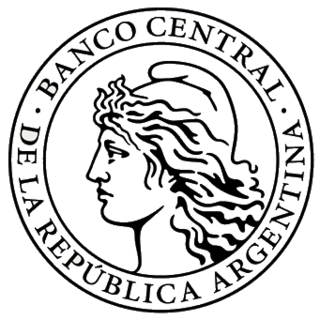
The Central Bank of the Argentine Republic is the central bank of Argentina, being an autarchic entity.

José Alfredo Martínez de Hoz was an Argentine lawyer, businessman and economist. He was Minister of Economy under Jorge Rafael Videla's administration between 1976 and 1981, and shaped economic policy at the National Reorganization Process.

Felisa Miceli is an Argentine economist, and a former Minister of Economy and Production of Argentina. She was appointed by President Néstor Kirchner on January 28, 2005, in place of Roberto Lavagna, and was the first woman ever to lead that ministry. She resigned to the position on July 16, 2007, as prosecutors stepped up an investigation into a bag of cash found in her ministry offices.

José Luis Machinea is an Argentine economist and United Nations official. He was Minister of Economy and President of the Central Bank.
Adolfo César Diz was an Argentine economist who was President of the Central Bank of Argentina from 1976 until 1981.

The Bank of the Province of Buenos Aires, better known as Banco Provincia, is a publicly owned bank in Argentina and the second-largest in the country by value of assets and deposits.
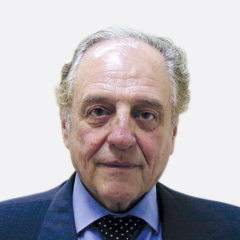
Carlos Heller is an Argentine executive, cooperative banking leader and politician, currently serving as member of the Argentine Chamber of Deputies, representing the Autonomous City of Buenos Aires, since 2019. He is the founder and president of the Solidary Party.
Banco Macro is the second largest domestically-owned private bank in Argentina, and the sixth-largest by deposits and lending.

Amado Boudou is an Argentine economist and politician who served as the Vice President of Argentina from 2011 to 2015. He previously served as Minister of Economy from 2009 to 2011.
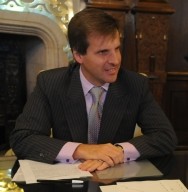
Hernán Martín Pérez Redrado is an Argentine economist. He served as President of the Central Bank between 2004 and 2010.

The economy of Argentina is the second-largest national economy in South America, behind Brazil. Argentina is a developing country with a highly literate population, an export-oriented agricultural sector, and a diversified industrial base.
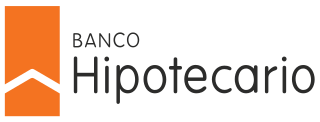
Banco Hipotecario is a commercial bank and mortgage lender in Argentina.

Mercedes Marcó del Pont is an Argentine economist and politician who was President of the Central Bank of Argentina. She has also served as a member of the National Chamber of Deputies, as head of the Federal Public Income Administration, and currently as Secretary of Strategic Affairs in the Presidency of Argentina.
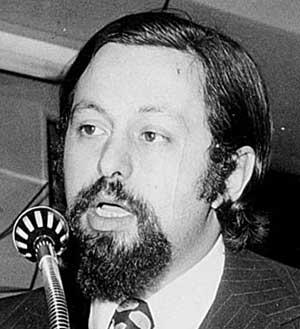
David Graiver was an Argentine businessman and banker who was investigated in the 1970s for alleged money laundering of US$17 million for the Montoneros, a leftist guerrilla group. He was indicted for embezzlement after his reported death by Manhattan District Attorney Robert Morgenthau, who had thought he might have faked his death, because of the September 15, 1976 failure of American Bank & Trust. This was the fourth-largest bank failure in United States history at the time, and Graiver's banks in Argentina and elsewhere also failed. A New York court declared Graiver officially dead on January 15, 1979, clearing the way for resolution of some outstanding financial issues.

Catalinas Norte is an important business complex composed of nineteen commercial office buildings and occupied by many leading Argentine companies, foreign subsidiaries, diplomatic offices, and a hotel. It is located in the Retiro and San Nicolás neighborhoods of Buenos Aires, Argentina.

The Presidency of Cristina Fernández de Kirchner began on 10 December 2007, when she became President of Argentina. She was an Argentine Senator for the Buenos Aires Province at the time of her victory in the 2007 Presidential election. Cristina Fernández de Kirchner became the second female president of Argentina, and the first one directly elected as such. In elections of November 2015, she was succeeded by Mauricio Macri as President.

Corruption in Argentina remains a serious problem. Argentina has long suffered from widespread and endemic corruption. Corruption remains a serious problem in the public and private sector even though the legal and institutional framework combating corruption is strong in Argentina.
The Bicentennial fund was created in 2010 in Argentina by then president Cristina Fernández de Kirchner, to pay external debt with resources from the Central Bank. The president of the Bank, Martín Redrado, refused to do so, claiming that the autonomy of the Central Bank was not respected.
References
- ↑ Clarín: Piden la prescripción del caso Banco Alas (in Spanish)
- ↑ Una pesada herencia Archived 2007-10-12 at the Wayback Machine (in Spanish)
- ↑ Lewis, Paul. The Crisis of Argentine Capitalism. University of North Carolina Press, 1990.
- ↑ "Corruption in High and Not-So High Places" Archived 2007-03-12 at the Wayback Machine - Odious Debts.
- ↑ Todo Argentina 1988 (in Spanish)
- ↑ Clarín: La Justicia ordenó que siga la causa contra un banco (in Spanish)